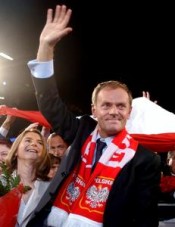The post-Communist and post-Solidarity coalition, The Left and Democrats (LiD), came out with 13.15% support and the agrarian Polish Peasants' Party, the last to be present in the new Sejm (lower chamber), received 8.91% of the votes. The Self-Defense (1.53%) and the League of Polish Families (1.3%) dropped out, as the threshold for the political parties to enter the Sejm is 5%. Translating the percentage results to the number of seats in the Sejm: Civic Platform (PO) -- 209, Law and Justice (PiS) -- 166, The Left and Democrats (LiD) -- 54, Polish Peasant's Party (PSL) -- 30, German Ethnic Minority (MN) -- 1. The Sejm numbers 460 seats, the necessary majority is 231. That means the winner party (PO) cannot rule alone, must get at least 22 mandates of support from another party (a probable coalition with the PSL provides a majority of 239 mandates). The elections to the Senate: PO -- 60 seats, PiS -- 49, independent -- 1.
The end of the Fourth Republic?
Speaking after the disclosure of the election results, on Sunday night, former President of Poland, Aleksander Kwasniewski, linked to a proverbial announcement of a Polish actress in 1989 "Communism ended today" and proclaimed "Fourth Republic ended today". To be true, the Fourth Republic, a concept of the Kaczynski twins, never even materialized. The big loser of the present elections, the Law and Justice party (PiS), came into being in 2001 as a political movement opposing the post-Communist influence in Poland after the 1989 regime change.
Their catching slogans, like "Down with the Commies", "End corruption", "Build a Fourth Republic" became popular and assured to PiS and their leaders, Lech and Jaroslaw Kaczynski, an election victory in 2005. Lech Kaczynski became President of Poland, defeating the present elections winner, Civic Platform leader Donald Tusk. Jaroslaw, his identical twin brother, controlled the government, first "from a back seat", then as its Prime Minister. But his rule soon got into trouble, due to poor support in the Parliament. A minority government, though supported by the President, could not pass important laws that were to change Poland's political system from a "bad" Third Republic to a "good" Fourth Republic. Jaroslaw Kaczynski was unable to form a "great coalition" with Donald Tusk's party, the Civic Platform (PO). The two major parties, PiS and PO, both with a Solidarity background, became opposing camps engaged in bitter fights.
To save his government, Jaroslaw Kaczynski had to engage PiS into a bizarre coalition with an agrarian populist Self-Defense (Samoobrona) of Andrzej Lepper and an urban nationalist-right League of Polish Families (LPR) of Roman Giertych, the marginal parties ironically called hors d'oeuvres. Disposing of no other possibility but to impose their authoritarian rule, the Kaczynski twins began a sweeping anti-corruption campaign and replaced former administration officials with their own, often incompetent cronies. From the local administration to the government level a permanent fight resulted. It came out that the new officials, like Minister of Justice Zbigniew Ziobro and a new powerful Central Anti-Corruption Bureau (CBA), were targeting political opponents and soon also their own coalition members. Scandals, quarrels, eavesdropping, spectacular arrests (with TV teams waiting to film them) became everyday practices. Even a justified dissolving of the Communist-infiltrated Military Information Services (WSI) had been carried out clumsily and hastily, without proper attention to the national security. The badly needed and retarded "lustration" (getting rid of former communist agents from public life) was politically inspired and too much power had been granted to historians and investigators of the Institute of National Remembrance (IPN), playing with agents' files for the benefit of the new regime. When it came out that a CBA sting operation targeted one of the deputy Prime Ministers, the head of the government quickly dismissed both his deputies from the coalition parties. The hors d'oeuvres had been "eaten up" by Law and Justice, and there was no other way but to announce snap elections. The errors committed by the coalition, the ever present scandals and the arrogance of the ruling group virtually buried the Fourth Republic. In spite of that, Jaroslaw Kaczynski announced its continuation in his final speech following the lost elections.
The last two years were full of strain and many people seemed to be even intimidated by undemocratic methods of the governance, breaches of law and heinous propaganda, aimed at all who didn't share the ideals of the Fourth Republic or opposed the "Twins-cracy" regime. The defeat of the Law and Justice (PiS) party in the present elections was not so much the result of the majority of the voters turning to the main opposition party (PO) as of their fear of the Fourth Republic dictatorial regime being imposed on them. A sort of a police state, they thought, might have resulted of these ideological projects. Poles had been fed up with the Communist police state in the past, why should they want a new one?
It's the economy, stupid
One of many popular jokes about the Kaczynski twins and their regime alluded to the emigration of Poles to Britain:
"What's the difference between Poland in World War II and 2007?
In World War II, the Polish government fled to London and the Polish people were at home. In 2007, the Kaczynski twins are home and the Polish people have fled to London."
Both the President and the Prime Minister boasted in their election campaign speeches about the superb state of the Polish economy, its yearly growth rate exceeding 7 per cent, an inflow of foreign capital equal to some 11 billion US dollars and the rate of unemployment quickly falling down to one digit levels. As the present economic trends are really exceptionally good for Poland (but not attributed to the present government), at the same time over 2 million Poles have left the country to look for better job opportunities and for an easier and safer life abroad: in Britain, Ireland, Germany, Belgium and other EU countries, and also in the United States. Several richer states of the European Union, of which Poland is a member since 2004, have opened their job markets for Poles, who can legally work there. The economic emigration is drawing out of the country the best educated and the most enterprising people, mostly young men and women. Once they get settled abroad, they stay there for a long time or even for good. Many of them would never have left the country if they could find well-paid jobs and favorable economic and social conditions in Poland. But they couldn't expect them here, in a country torn by ideological conflicts, with a government turned more to the past than to the future.
Donald Tusk and his fellow party leaders of the Civic Platform (PO) campaigned in Britain and in Ireland among the Polish emigrants, promising them better chances in Poland and getting their support for the PO in the October 21 elections. But the Polish Consulates have organized the voting so badly that thousands of Polish citizens in Britain, Ireland, Belgium and other countries could not cast their votes.
The Civic Platform (PO) has promised to change the economic conditions in Poland for the better ("Life will be better") by promoting free enterprise, simplifying economic laws and regulations, creating more jobs. But it won't be an easy process and it will take a longer time to be accomplished. After the election victory, Donald Tusk will probably become Prime Minister and he will organize his government. There are some rumors that independent economic experts could become cabinet ministers and that the Tusk government will be moderate in spending and more efficient. The next months will show how these promises will be carried out. The Law and Justice (PiS) party won the elections in 2005 with a promise of "economical government" and ended with boosting the budgets of the President's and Prime Minister's offices to more than 300 million zlotys (some $100 million). Last summer, the President flew an almost empty 180-seat Russian-made Tupolev plane to Gdansk and back to Warsaw 2-3 times a week, demanding a Bell helicopter to be flown from Warsaw to Gdansk each time to carry him to the presidential residence in Jurata on Hel Peninsula. "A ride to Hell", mocked some journalists. And the hors d'oeuvres leaders, Lepper and Giertych, rode to the Holy Shrine in Czestochowa in their luxury limousines to pray to the Black Madonna (incidentally, when TV camera teams were waiting there!). The ostentatious style of the coalition leaders also drew harsh criticism, leading to their defeat.
Poland's economy is in good shape, in spite of all political turbulences. But everybody knows that favorable trends don't stay forever and the Polish economic system is in need of deep reform. Like Bill Clinton used to say "It's the economy, stupid!" and he paid attention to the U.S. economic progress, so the newly elected Polish leadership should earmark economic development as their primary target.
Foreign policy and "diplo-cretins"
One of the most respected Polish politicians, former minister of foreign affairs Professor Wladyslaw Bartoszewski, coined a funny but true name for newcomer diplomats installed by the Law and Justice party, calling them "diplo-cretins". In the pitiless language of the Professor, 85, who has spent many years in German death camps and Communist prisons, this neologism sounds perfect. But the inexperienced PiS diplomats, including the Foreign Minister, Mrs. Anna Fotyga, could feel offended.
As in the economy, also in the foreign policy, the Law and Justice party propagandists boasted of extraordinary successes. No less true. The Polish foreign policy needs a complete overhaul to bring it back to the normal international standards. The last two years of the Kaczynskis' rule sharply undermined Poland's international reputation and standing, particularly the relationships with Poland's strong neighbors--Germany and Russia--and also with other members of the European Union. The relations with the United States were seemingly good, but rather unproductive. As the Polish government kept its 900-strong military contingent in Iraq, in spite of previous promises to withdraw the troops in 2007, and sent 1,200 soldiers to Afghanistan on ISAF combat missions with no reward from the U.S.A., adding to more than 1 billion zlotys (USD 300 million) expenses from our taxpayers' pockets for the distant U.S. wars, we were not able to negotiate favorable terms from the U.S. government for Poland's agreement to build an American "missile shield" on our soil. At the same time the Czechs and the Estonians obtained visa-waivers for their citizens traveling to the United States. As one former Polish diplomat remarked, "Poland is a poor bride without a dowry". Should that be a rule?
Donald Tusk, a pragmatic leader from Gdansk

Donald Tusk, 50, born in Gdansk to a poor Kashubian family (a Polish ethnic minority), a former anti-Communist opposition and Solidarity Trade Union activist. A historian and writer. After the regime change in 1989, one of the leaders of the Liberal-Democratic Congress (KL-D), Member of Parliament (Sejm), Senator and Deputy Speaker of the Senate. A candidate for President of Poland in 2005 (lost to Lech Kaczynski but got more than 5 million votes), Chairman of the Civic Platform (PO), one of the two biggest political parties in Poland. His party has just won the elections to the Sejm (lower chamber) and to the Senate. Donald Tusk himself got a record number of votes, over 530,000. He is to become the next Prime Minister of Poland. Tusk is married to Malgorzata (Margaret), has two children: a daughter, Katarzyna (Kate,18), and a son Michal (Mike, 23). He lives in Sopot (a spa city near Gdansk), speaks English and German and is a dedicated soccer player. They keep a dog and two cats at home.

 Warsaw, Tuesday, October 23: Poles went to the polls on Sunday and the turnout was a record high since 1991:
53.8 percent (out of 30 million citizens registered, over 16 million cast valid votes). The October 21 snap elections in Poland could be the most important since the regime change in 1989. A majority of the voters, including most of the young ones, cast their ballots for the Civic Platform (PO), a pro-business center-right party (41.51 %), expressing their disillusionment with the two years of the rule of the Kaczynski Twins' conservative Law and Justice (PiS) party and their bizarre coalition with the populist Self-Defense (Samoobrona) and the nationalist-right League of Polish Families (LPR). Yet, Law and Justice remains a strong opposition (32.11%).
Warsaw, Tuesday, October 23: Poles went to the polls on Sunday and the turnout was a record high since 1991:
53.8 percent (out of 30 million citizens registered, over 16 million cast valid votes). The October 21 snap elections in Poland could be the most important since the regime change in 1989. A majority of the voters, including most of the young ones, cast their ballots for the Civic Platform (PO), a pro-business center-right party (41.51 %), expressing their disillusionment with the two years of the rule of the Kaczynski Twins' conservative Law and Justice (PiS) party and their bizarre coalition with the populist Self-Defense (Samoobrona) and the nationalist-right League of Polish Families (LPR). Yet, Law and Justice remains a strong opposition (32.11%). Donald Tusk, 50, born in Gdansk to a poor Kashubian family (a Polish ethnic minority), a former anti-Communist opposition and Solidarity Trade Union activist. A historian and writer. After the regime change in 1989, one of the leaders of the Liberal-Democratic Congress (KL-D), Member of Parliament (Sejm), Senator and Deputy Speaker of the Senate. A candidate for President of Poland in 2005 (lost to Lech Kaczynski but got more than 5 million votes), Chairman of the Civic Platform (PO), one of the two biggest political parties in Poland. His party has just won the elections to the Sejm (lower chamber) and to the Senate. Donald Tusk himself got a record number of votes, over 530,000. He is to become the next Prime Minister of Poland. Tusk is married to Malgorzata (Margaret), has two children: a daughter, Katarzyna (Kate,18), and a son Michal (Mike, 23). He lives in Sopot (a spa city near Gdansk), speaks English and German and is a dedicated soccer player. They keep a dog and two cats at home.
Donald Tusk, 50, born in Gdansk to a poor Kashubian family (a Polish ethnic minority), a former anti-Communist opposition and Solidarity Trade Union activist. A historian and writer. After the regime change in 1989, one of the leaders of the Liberal-Democratic Congress (KL-D), Member of Parliament (Sejm), Senator and Deputy Speaker of the Senate. A candidate for President of Poland in 2005 (lost to Lech Kaczynski but got more than 5 million votes), Chairman of the Civic Platform (PO), one of the two biggest political parties in Poland. His party has just won the elections to the Sejm (lower chamber) and to the Senate. Donald Tusk himself got a record number of votes, over 530,000. He is to become the next Prime Minister of Poland. Tusk is married to Malgorzata (Margaret), has two children: a daughter, Katarzyna (Kate,18), and a son Michal (Mike, 23). He lives in Sopot (a spa city near Gdansk), speaks English and German and is a dedicated soccer player. They keep a dog and two cats at home.